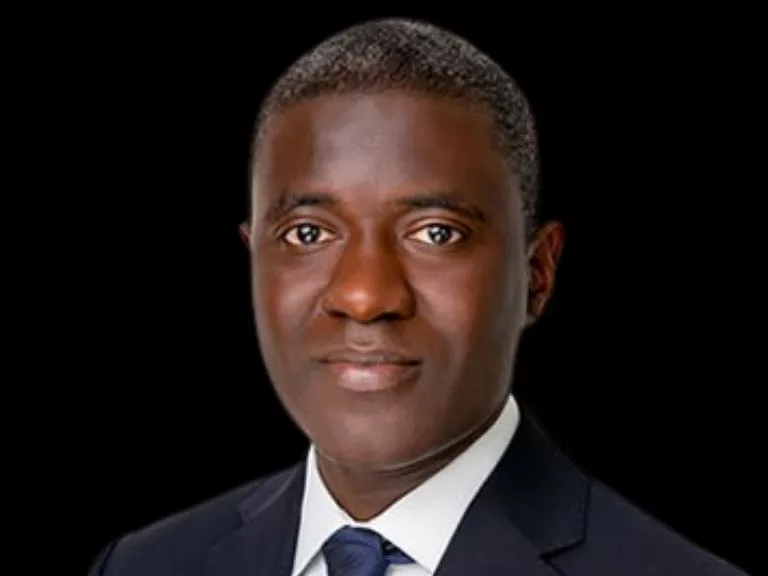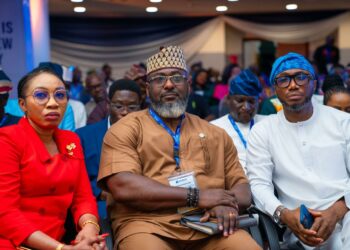On October 11, 2023, Prof. Umar Danbatta, took a bow from office as Aminu Maida was appointed by President Ahmed Tinubu, as the executive vice chairman of the Nigerian Communications Commission (NCC).
To stakeholders, Prof. Danbatta, has done well in boosting the ICT sector, especially in the area of its contribution to the Gross Domestic Product (GDP) of Nigeria.
As Aminu Maida takes over from Danbatta however, stakeholders have urged him to continue in that momentum, even as they have set agenda that will guide him, in his quest of taking the ICT sector to the next level.
Maida is a seasoned technical professional with over 15 years of diverse experience in FinTech, Telecoms, and Enterprise Technology.
Before his appointment as the executive vice chairman of the NCC, Maida served as the executive director, Technology and Operations at Nigeria Inter-Bank Settlement System Plc (NIBSS), a central switch company owned by the Central Bank of Nigeria and all licensed Deposit Money Banks in Nigeria.
He has gained international experience working in various roles. He was previously the chief technology officer at Arca Payments Network, a Nigerian-based FinTech company, and a senior manager at Cisco Systems UK. Between 2010 and 2014, Maida worked as a network design consultant at EE, a part of BT Group and one of the largest mobile communications companies in the UK. From 2006 to 2010, he served as a system engineer at Ubiquisys, a leading company in intelligent 3G and LTE small cells, which is now part of Cisco.
Maida holds an MEng in Information Systems Engineering from Imperial College London (2002) and a PhD in Electrical and Electronic Engineering from the University of Bath UK (2006). He also completed a Post Graduate Diploma in Entrepreneurship (FinTech Pathway) program at the Cambridge Judge Business School between 2018 and 2019.
Maida’s appointment to the NCC is notable as he comes from outside the Nigerian telecom industry, bringing a fresh perspective and extensive experience in telecom operations, stakeholders averred.
“This is the more reason, we need to set agenda for him, to guide him on areas he needs to start working on,” the national president, National Association of Telecoms Subscribers (NATCOMS), Chief Adeolu Ogunbanjo told NATIONAL ECONOMY.
Ogunbanjo posited that Maida inherited several unfinished projects from his predecessor, including multiple taxation, Right-of-Way (RoW), rekindling the quest for Critical National Infrastructure bill to tackle the issue of vandalism and achieving broadband penetration targets.
Multiple Taxation:
On multiple taxation, Ogunbanjo decried the about 49 different taxes and levies that operators have to pay, even as he appealed to the new EVC, to work with the Federal Inland Revenue Service (FIRS) to review the taxes.
Telecom businesses attracted only $25.81 million Foreign Direct Investments (FDI) in the second quarter of this year, compared to the $153.50 million recorded in the same period last year. This represents a 494 per cent decline year on year.
“I appeal to Maida to set up a committee that will meet with FIRS and examine some of these taxes, because it is killing the industry. It is seriously affecting FDI into the country. He should work with FIRS to ensure that multiple taxation issue is addressed,” the national president, NATCOMS appealed.
In the same vein, the chairman, Association of Licensed Telecommunications Operators of Nigeria (ALTON), Engr. Gbenga Adebayo, averred that telecom operators have continue to bear the brunt of multiple taxation and coerced compliance with tax and levy demands that have no legal basis by sub-nationals, adding that this threatens investment, sustainability and industry growth.
Adebayo listed some of the taxes and levies as ecology tax for gaseous emission; sewage, sanitation and public convenience levy for base stations; fumigation levies: states demand for the payment of fumigation charges of base station; sanitation and refuse effluent tax for base stations; business premises tax for base stations; annual renewal on Right of Way (RoW) and fire service levy.
He lamented that tenements rates charged per base station in some states is far higher than rates per square metre charged by the same state for residential and commercial buildings when the infrastructure occupies the same land.
Adebayo however advocated the need for the sector to collaborate with the presidential committee on Fiscal Policy and Tax Reforms to address the perennial incidence of multiple taxation in the Nigerian telecommunications sector including the elimination of the currently suspended excise duty on telecommunications services.
Damages To Telecoms Infrastructure:
Adebayo averred that telecommunications serves as an ‘enabler’ for all other critical infrastructure and infrastructure sectors vital to national productivity and security. To function optimally, ALTON chairman said telecommunications infrastructure relies on complex and interconnected support ecosystem consisting of fiber, satellites, towers, base stations, switches, data centers, etc., which need to function uninterrupted for delivery of optimal Quality of Service (QoS).
He regretted that there have been incidences of adverse cross-sectoral impact on QoS arising from damage to such infrastructure due to excavation during civil works such as road construction, deliberate/negligent vandalisation and sabotage as well as theft of cable, equipment, and supplies such as diesel, generators and batteries, undue delay in issuance of site approvals for new towers/base stations as well as harassment of staff /site access denial by state/local agencies to enforce levy payments.
ALTON chairman however called for collaborative partnership with key stakeholders to secure executive and legislative action on the declaration of telecoms infrastructure as Critical National Infrastructure (CNI) and criminalisation of malicious site sealing, access denials, and willful/negligent destruction of telecommunications infrastructure.
“This can be done either by an executive order or relevant amendment of the Cybercrimes Act; an attempt was made by the immediate past National Security Adviser (NSA) to secure Presidential approval for an Executive Order (EO). The new EVC is respectfully requested to liaise with the current NSA to bring to fruition the EO on CNI.
“The new NCC boss should also rekindle the quest for Critical National Infrastructure Bill, a bill that will tackle the issue of vandalism of base stations, which is very rampant,” Ogunbanjo advocated.
Right Of Way (ROW):
On Right of Way (RoW), Ogunbanjo has appealed to Maida to invest in states like Anambra that has waived RoW charges, while continuing the conversations with other states to follow suit. “If all state governments waived their RoW charges, Nigeria will be able to achieve 70 per cent broadband penetration by 2025,” Ogunbanjo assured.
Adebayo joined his voice to appeal to the NCC boss to sensitise and advocate for state governments’ adoption of the harmonised RoW charge of N145/Linear Meter approved by the National Economic Council in 2019.
According to him, “To support the provision of widespread broadband service, including 5G services, we recommend that the new NCC boss should set more affordable prices for spectrum taking into consideration the developmental benefits improved broadband delivery will have on our local economy especially as studies have shown that high spectrum prices are linked to slower broadband speed and poor coverage.
“The Commission should introduce a flexible spectrum license payment terms in line with the recommendations of the Nigerian National Broadband Plan 2020 – 2025 which will allow operators to spreading payments of spectrum fees across the lifetime of the license.
“The Commission should also incentivise investment in spectrum by providing additional value in the form of rebates on regulatory fees and other payables especially where such frequencies are needed for backhaul purposes as an alternative to fibre. This will reduce the capital expenses of such operators and enable faster rollout of services on such spectrum. We believe that this aligns with the HM’s objective to develop incentive structures to drive investments as espoused in the Strategic Plan.
“With specific reference to 5G, a review of the licensing approach and pricing methodology for 5G backhaul frequencies as the current methodology is designed for legacy narrow backhaul channel sizes, which means costs quickly become unsustainable for the newer wider channels required for 5G service. This should be done with the aim of reducing the rollout cost burden on operators.”
No Need For Increase In Tariff
While there is agitation by telecom operators to increase call and data tariff, Ogunbanjo has urged Maida to ignore such agitations, as it will be unfair to Nigerians, who are grabbling with a lot of challenges. “We know operators are not immune to the harsh economy. However, Nigerians are also bearing the brunt as well. Increasing call tariff, at this critical time that is hard to deal with, will be unfair to subscribers,” he stated.





